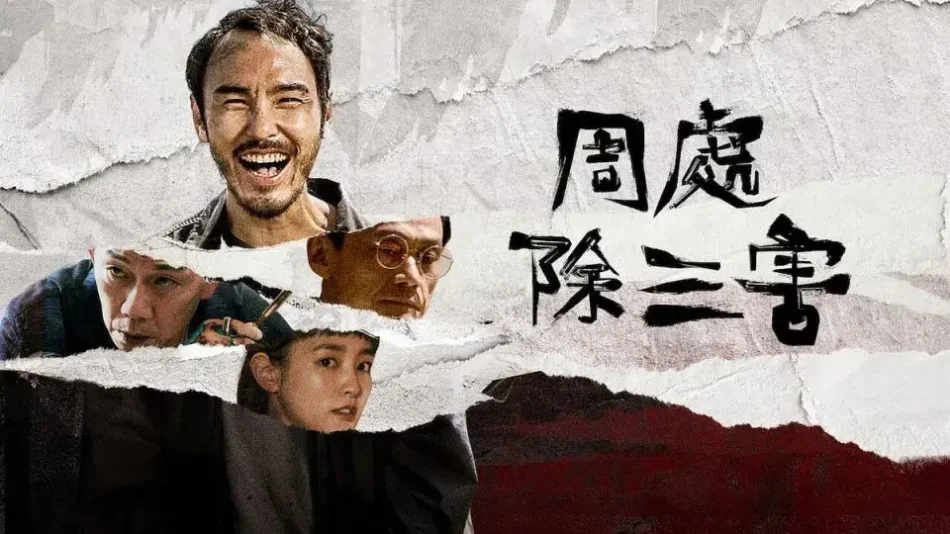(may contain spoilers)
Douban rating: 8.1
Director: Wong Ching-po
Starring: Ethan Juan, Ben Yuen, Chen Yi-wen
Douban Comments: “’The Pig, the Snake, and the Pigeon’ is the English translation of the story ‘Zhou Chu Eliminates the Three Evils’, which happens to correspond perfectly to the ‘Three Poisons’ in Buddhist reincarnation: greed, hatred, and ignorance. The pig represents ignorance, meaning a lack of understanding and inability to distinguish between good and evil, leading to all kinds of wrongful acts. This symbolizes Chen Guilin’s evil, with his grandmother’s pig-shaped watch serving as an emblem. The snake represents hatred, arising from adverse circumstances and resulting in violent rage, aptly corresponding to Xianggangzai’s brutal bullying, who also has a snake tattoo on his hand. The pigeon represents greed, characterized by dissatisfaction unless one’s desires are met. This is represented by Lin Luhe, who appears gentle but is actually greedy, with pigeon wings tattooed on his back.
In Tibetan Buddhist murals, both the snake and the pigeon are depicted as emerging from the mouth of the pig, signifying that all beings’ attachments stem from ignorance, leading to differentiation. Chen Guilin, likened to Zhou Chu, shoots the pigeon and kills the snake, starting with ignorance as the root of evil and ending with letting go of attachments. The Three Poisons are the fundamental causes of all evil deeds. When Chen Guilin dies, the suffering of all beings in the cycle of reincarnation dissipates with him.”

“Considering that the rating is already quite high, my opinion won’t make much difference, so I’ll boldly point out some issues I found:
- The depiction of Chen Guilin’s battle damage is unreasonable; it’s overly exaggerated for him to kick the coffin while wounded.
- Chen Guilin’s motivation for eradicating violence is insufficient and should be strengthened.
- When Chen Guilin kills Xianggangzai and Niutou, he initially doesn’t use a gun, which makes him seem less intelligent.
- The ending is too drawn out compared to the prologue.
- The anecdote about Zhou Chu causing harm shouldn’t be directly mentioned by the protagonist.
- In the scene at the spiritual training class, the chubby kid is forgotten at the end; there should be a shot explaining his situation.
- The character played by Wang Jing reflects the director’s complex for rescuing women in distress, similar to themes in “Triad Underworld” and “Revenge: A Love Story”.
- The police officer doesn’t seem to mind at all that Chen Guilin blinded him in one eye.
- The two biggest fugitives in the region couldn’t be found by the police, yet Chen Guilin finds them immediately.
Overall, the movie is still worth watching. The high ratings are mainly because mainland Chinese audiences, who are not used to bloody films, have seen too few of them. The censorship cycle always alternates between lenient and strict. Anti-cult films making it to the big screen is positive, and it might be worth making a separate film on that theme.”
“4.5 stars. The film’s visuals, action-packed and brutal killings, ensemble scenes, and social commentary are all strikingly powerful. Ethan Juan delivers one of the most unforgettable portrayals of a charismatic serial killer in Chinese-language cinema – utterly insane yet profoundly pure. He lives only through madness. When the lines between good and evil, crime and punishment blur, and the screen is drenched in blood, you still can’t help but feel deeply moved by his inevitable fate – I cried my eyes out.
This is a blood-soaked, twisted ‘Taiwanese Odyssey’ wrapped in the road movie genre, but also a journey of self-redemption and inner purification. Its exploration of spiritual control, religious belief, and the legitimacy of the death penalty is all anchored in the Buddhist notion of ‘ego driven by greed, anger, and delusion’. It may seem fragmented, but it’s actually cohesive.
Locking this in as one of the Top 3 Chinese-language films of the year.”








